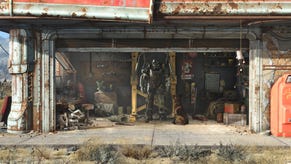This game could save your life one day: Genes in Space vs Cancer
Play to Cure: Genes in Space takes the long process of analysing genetic data linked to cancer growth and turns it into a game. Dave Cook speaks with developer Guerilla Tea to better understand how this sci-fi title could very well save your life one day.
"In the game's first four weeks, Genes in Space pilots collectively analysed data that would have taken scientists six months to process."
According to Cancer Research UK data published in February, an estimated 14.1 million people were diagnosed with cancer worldwide in 2012. Globally, it killed 8.2 million sufferers in that year alone.
The race to cure cancer continues.
This most noble of causes has been given greater prominence in recent years thanks to the enduring efforts of fundraisers, campaign groups and other contributors eager to do their part. While donations are helpful in funding the costly scientific research needed to unlock cancer's mysteries, the time required to analyse volumes of genome data simply cannot be bought.
This months-to-years-long process cannot be carried out by machine algorithms either, as there are subtleties within the data that can only be identified by scientific eyes. It is a significant undertaking that demands a colossal human effort, but for every month spent processing gene microarrays, thousands more are being told that they have cancer, and are suddenly finding themselves on borrowed time. That is a terrifying situation to imagine.
While this might seem like a grim outlook, it is also very real, because cancer could very easily affect you or a loved one at some point in your life. It may have already happened to someone you know. It's clear that time is precious, and understanding this all too well, Cancer Research UK decided to do something radical, unproven and positively disruptive within this field to help accelerate its work.
On March 1, 2013, the charity, together with Amazon Web Services, Facebook and Google launched a three-day game jam in London to see if there was scope to help speed up the gene research process through play. The companies; along with 40 academics, coders, graphic designers and other technically-minded individuals, pooled their knowledge in an attempt to turn the reading of raw gene data into a game concept.
It was proposed that if you have many people each playing the same game, where a single level involves the player subliminally analysing a research sample, then the overall player-base could collaboratively and significantly speed up the research process. The game jam proved to be a success and the final concept was then optioned to developers who were invited to pitch ways in which the findings could be applied in a gaming environment.
Scottish indie studio Guerilla Tea won the contract and implemented Cancer Research's microarray processing requirements into a sci-fi title for iOS and Android called Play to Cure: Genes in Space. In it, you play as a pilot employed by Bifrost Industries who is tasked with going out into the far reaches of space in search of precious Element Alpha.
Each stretch of the cosmos represents a waveform of gene microarray data, and while you're free to plot your own course through the stage, you are encouraged to chart a path through areas where the data is more dense, because doing so earns you more Element Alpha. That's the progression incentive of course, but in reality it makes your analysis more effective. Gameplay consists of flying through rings while blasting incoming asteroids using touch or tilt, before converting your collected resources into money that can be spent on upgrading your craft.
It's a simple game that is also incredibly important, because while each stage can be completed in about a minute, that combined investment of time across all players has yielded great results so far. In the game's first four weeks after launch, Genes in Space pilots collectively analysed data that would have taken scientists six months to process. That is an incredible breakthrough, and one I was keen to discuss with Guerilla Tea's Chief Design Officer Charlie Czerkawski.
"The data comes from breast cancer patients collected from the UK and Canada," he tells me. "One data sample that you analyse during a single round of gameplay is data from a single chromosome from a single cancerous cell. The scientists are looking for anomalies; basically changes in the patterns of the data. The game effectively gets players to identify these anomalies."
On what scientists are specifically looking for within the data, Czerkawski explains, "They’re looking to identify the areas within the genetic data that deviate from the normal distribution. The data for a normal chromosome would roughly look like a dense strip horizontally moving from left to right. You’ll see these repeating if you play a lot of different levels of the game. However, notice that some maps have dense areas that deviate significantly from the normal left-to-right pattern.
"In terms of common video game conventions, we had to be very careful and there were a good number of features that we had to steer clear of as they would have damaged the data analysis."
"It is these anomalies that the researchers are particularly interested in because they represent mutations in the DNA that may be related to cancer. Although some of these variations are quite easy to spot, all the data must be analysed because even a slight deviation could indicate a mutation. Through sheer volume and repeated analysis of the same samples, results will come to light."
While Genes in Space appears to be a simple space sim on the surface, there is a lot of technical processes running beneath the hood. I asked Czerkawski for some insight into how the game's development differed from other, commercial titles. "The process was a bit unorthodox in comparison to regular game development projects," he replies. "Throughout the games development there was a lot of back and forth between Guerilla Tea and the Cancer Research UK scientists.
"From the very beginning of the project we were provided with test samples from the dataset that needed to be analysed, and we immediately began prototyping the data analysis mechanics. Along the way we had many different test samples of data to represent the full range of samples the full game would use, and using these with each iteration of the game (passing on the results to the scientists) allowed them to verify that the data we were producing was valid."
The real trick was balancing the act of reading scientific data that would normally appear quite dry to uninterested minds, and turn it into a play-thing that would keep people coming back to participate regularly. Like many mobile titles, there is a rapid growth mechanic that regularly dispenses gratification. XP earned after each stage can be used to level up, which in turn opens up new cannon types, and other upgrades. At level 20 you can unlock a second ship and so on. All of this has been designed cleverly to ensure repeat play, and of course, constant analysis.
"This was by far the greatest challenge for all of us, but particularly myself as the game designer," Czerkawski goes on. "The disguise of data analysis beneath the ‘veil’ of gameplay was the fundamental vision and the core of the remit, so we were always refining and working towards it. In terms of common video game conventions, we had to be very careful and there were a good number of features that we had to steer clear of as they would have damaged the data analysis.
"In terms of features that we could implement, we had to focus on the minutiae and gameplay balancing to really ensure the most accurate data, as well as making the game as entertaining as possible, so there was a lot to bear in mind during development. This was also the main reason that we went with a type of modular design, so the gameplay was divided into distinct sections.
"The player maps their route, then flies through space to collect element alpha. These two phases are used for data analysis. Afterwards, there is an asteroid field to negotiate which is fully separate and not used for analysis. This was the best way we could create an interesting game without compromising the data."
Czerkawski feels that crowd-sourced research efforts like Genes in Space are "essential" to the mass analysis of genome data, and he has been surprised by the positive so far. Those who have historically condemned games, or perhaps see them as little more than time wasters have also come round to the idea since learning of the project's scientific and healthcare implications. As far as Czerkawski is concerned, Guerilla Tea's game cannot be contested by sceptics in the same way as other titles, and he tells me that several scientific bodies have since applauded the concept.
The reach of Genes in Space is growing by the day, and has since featured on the BBC, and other news networks. At last count, Czerkawski noted that players had worked their way through 1.5 million classifications which, he explains, is the equivalent of 40 miles of DNA Data laid out end-to-end. It's clear that the grand experiment is working, so I ask him if other scientific bodies could employ the game's underlying framework while researching other ailments.
"Absolutely," he says. "There have been other similar projects in the past such as Cell Slider and Folding at Home, although Genes in Space is the first to really attempt the disguise of the analysis in a regular video game. Video games could be used for any analysis that involves a simple pattern recognition task, and so long as no deep, specialist knowledge is required. It depends on the end goal, and would require creative game design, but I believe video games have a huge amount of untapped potential and Genes in Space is just at the start of a very interesting journey."
"It can definitely play a key part in developing new treatments," Czerkawski concludes. "The game has not only sped up the work of researchers, it’s also put a different slant on the analysis that a computer cannot achieve. This will be used moving forward, and with the results of Genes in Space, researchers will hopefully be able to identify genetic causes of cancer, leading to new treatments."
Cancer is killing millions every year, and there's simply no telling if someone from your close circle of family or friends might be diagnosed with it at some point in their life. It could even happen to you, but through the collaborative work being encouraged by Cancer Research UK, Guerilla Tea and countless other organisations and charities across the world, we can all contribute to seeing cancer beaten for good.
You can also do your bit by downloading Play To Cure: Genes in Space absolutely free of charge on either iOS or Android and playing for just a few minutes every now and then.
It could legitimately save your life one day.












